The following is an excerpt from a discourse on Real Dīkṣā, Sannyāsa and Samādhi delivered by Śrīla Bhaktivedānta Nārāyaṇa Mahārāja in Alachua, Florida, on June 17, 1999
In Dvārakā, Kṛṣṇa sat at the shore of the ocean. It appeared that a hunter shot Him in the foot, and it seemed that He died. Only fools think so.
Listen to this story, and then tattva (philosophical truths) will come to you. Once, there was a king and queen. One day a family of magicians came to the palace to perform a magic show. The father, his wife, and their two young sons, who were nine and ten years old, made a marvellous magic show. The king and queen and the whole audience were very pleased. The queen gave the wife of the magician a wonderful golden necklace, as a token of her appreciation, but both her sons wanted it. They each said, “I’ll take it, Mother. No, I’ll take it, Mother.” The boys began to fight over the necklace, pulling it back and forth. They were of equal strength and neither could win. They finally became so furious that they simultaneously pulled their swords from their sheaths and cut off each other’s heads. Their mother was so grief-stricken that she took her sword and cut off her own head. Then, in total despair, not able to live under the circumstances, the father took his own sword and cut off his own head.
You can imagine the horror of the king and queen and other spectators. The queen especially was feeling responsible, as she had given the necklace which caused the tragedy. The bodies and heads were taken away and no one could stop thinking about the very sad affair. The next day, however, the queen received a letter from the father of the magicians. The letter stated, “Thank you very much for the gift that you gave us for our first magic show. Your necklace is with us and we are very happy but we are waiting for our second gift. Where is the gift for our second show? Don’t worry. We didn’t die. Please come and see us.” The astonished king and queen immediately went to the home of the magician family, where they were warmly welcomed, and they were very happy to see them all alive and well.
There was another, even greater, magician named P.C. Sarakāra (P. C. Sorcar). He performed magic shows during the time of the British occupation of India. He was so famous that even the governor, the viceroy, and other chief government ministers would all come to see him. Once, in Calcutta, he called all the important government heads to come to see his show at four pm. Being very punctual, they all came at exactly four o’clock and sat in the assembly. They waited for P.C. Sarakāra, expecting him at any moment, for they were all very busy and important people who did not expect to be kept waiting. Five minutes passed, then fifteen, then half an hour. The men became very angry and said to each other, “Just wait until we get a hold of P.C. Sarakāra. When he comes here 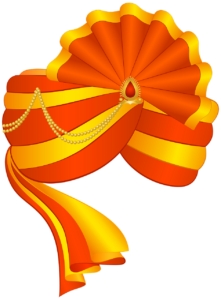 we will punish that rascal for making us late for our important appointments.” Finally, at five o’clock, a smiling P.C. Sarakāra casually walked on stage. The men angrily began chastising him, “Why are you late? Why have you kept us waiting? Don’t you know that we are very busy and important?” P.C. Sarakāra nonchalantly said, “What is the matter?” They replied, “You told us to come at four o’clock, and we have been waiting for an hour!” P.C. Sarakāra said, “I am afraid you are mistaken. Look at your watches. It is just now four o’clock.” When they looked, all their watches said four o’clock. They were amazed to realize the magic show they had just witnessed.
we will punish that rascal for making us late for our important appointments.” Finally, at five o’clock, a smiling P.C. Sarakāra casually walked on stage. The men angrily began chastising him, “Why are you late? Why have you kept us waiting? Don’t you know that we are very busy and important?” P.C. Sarakāra nonchalantly said, “What is the matter?” They replied, “You told us to come at four o’clock, and we have been waiting for an hour!” P.C. Sarakāra said, “I am afraid you are mistaken. Look at your watches. It is just now four o’clock.” When they looked, all their watches said four o’clock. They were amazed to realize the magic show they had just witnessed.
If an ordinary magician can do such things, why not Kṛṣṇa? He created Brahma and Śiva. Surely He cannot die. He only made it appear that He died when the hunter shot Him. It was like a drama. Even Kṛṣṇa’s devotees cannot die. Bhīṣma is an example. He could only leave his body when he desired it.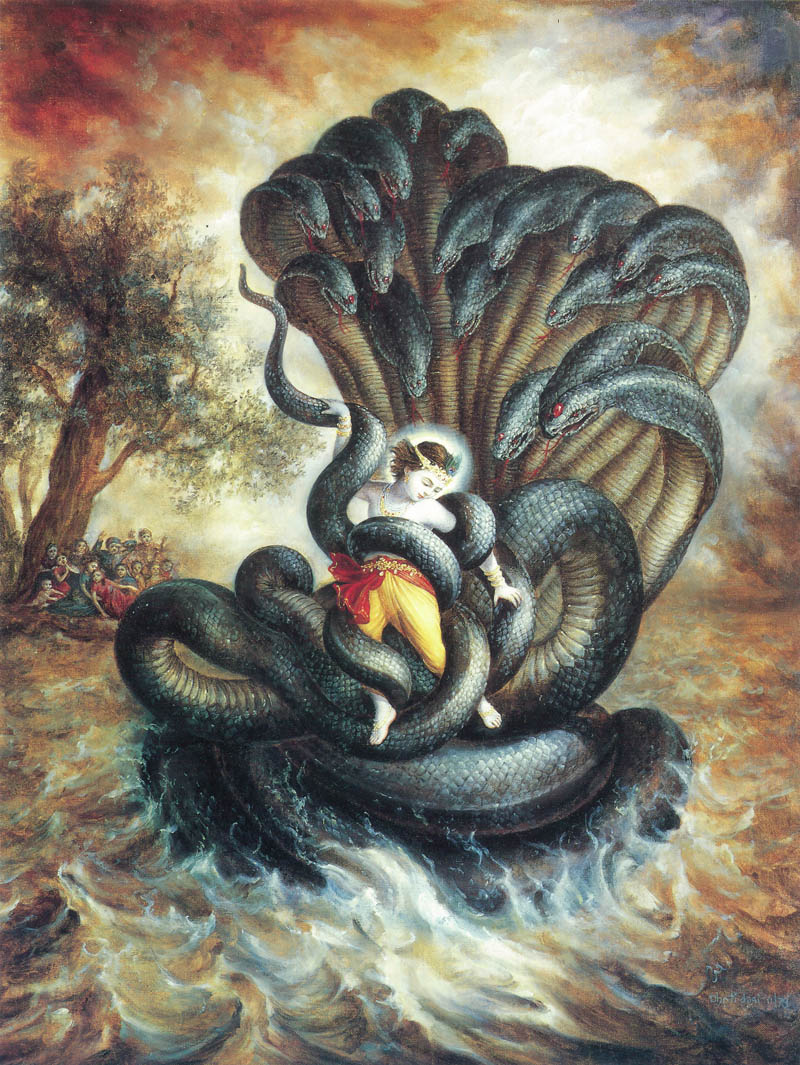
Kāliya made so much poison. All the calves and cowherd boys were ‘dead’. But Kṛṣṇa did not die, and by His glance all the boys come back to life. This is Kṛṣṇa’s symptom. No one else can do as He can. He is Svayam Bhagavān and He is performing His pastimes.
The following excerpt is from Śrīla Bhaktivedānta Nārāyaṇa Mahārāja’s discourse in Hong Kong, on July 2, 2006, published in The Hidden Path of Devotion
Anarthas include nāma-aparādha, sevā-aparādha (offences in the execution of devotional practices) and so on. If you follow this regulative process, anarthas will diminish and gradually go away, and then niṣṭhā will come. Niṣṭhā means steadiness of mind. The devotee fixed in niṣṭhā will determine, “I can die, but I cannot give up chanting the holy name.” Śrīla Haridāsa Ṭhākura was beaten in twenty-two marketplaces. As they beat him, the miscreant Muslim government followers demanded, “You should chant Allah! Hoda! Don’t chant Hare Kṛṣṇa!” But he continued to chant, “Hare Kṛṣṇa Hare Kṛṣṇa, Kṛṣṇa Kṛṣṇa Hare Hare, Hare Rāma Hare Rāma, Rāma Rāma Hare Hare.” At last he became almost like a skeleton – bloody and only some skin remaining – and finally they 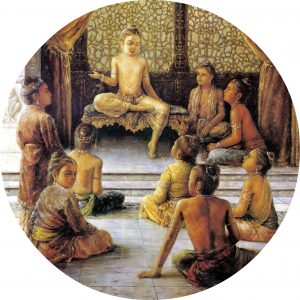 threw him into the Ganges.
threw him into the Ganges.
Śrīla Haridāsa Ṭhākura later came out of the Ganges as if nothing had happened, and he was still chanting, “Hare Kṛṣṇa, Hare Kṛṣṇa.” At that time his prosecutors fearfully begged pardon at his lotus feet. Haridāsa Ṭhākura personified niṣṭhā.
Do you know about Śrī Prahlāda Mahārāja? His father tortured him in various ways and ordered, “Don’t speak the name of Viṣṇu, my enemy!” But Prahlāda never followed that order. He was always chanting, “Kṛṣṇa, Kṛṣṇa, Kṛṣṇa.” Oh, be like that – very strong. Kṛṣṇa’s mercy will then come to you.
An excerpt from a morning walk with Śrīla Bhaktivedānta Nārāyaṇa Mahārāja in Pui O, Hong Kong, on April 16, 2008, published in Walking with a Saint – Morning Walks and Conversations 2008
Uttama-kṛṣṇa dāsa: Gurudeva, regarding the question of karma: If I beat somebody, does it mean that person previously beat me? For example, if he owed me ten dollars, now he is paying me back. Is it like this?
Śrīla Bhaktivedānta Nārāyaṇa Mahārāja: No. We should tolerate this, as Śrīla Haridāsa Ṭhākura was tolerant. 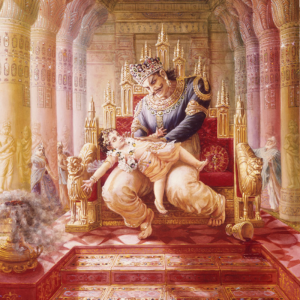 Prahlāda Mahārāja was given poison, put in a fire, and tortured in many other ways; but he never thought, “I will take revenge against my father.” This is not Vaiṣṇava etiquette.
Prahlāda Mahārāja was given poison, put in a fire, and tortured in many other ways; but he never thought, “I will take revenge against my father.” This is not Vaiṣṇava etiquette.
Śrīpāda Padmanābha Mahārāja: What if that devotee is thinking, “Somebody is coming to kill me!”? But his body belongs to Gurudeva.
Śrīla Bhaktivedānta Nārāyaṇa Mahārāja: You are not Prahlāda or Sītā-devī. You should try to escape, to save your life.
Śrīpāda Dāmodara Mahārāja: Nityānanda Prabhu ran away when Jagāi and Mādhāi went to beat him. Śrīla Haridāsa Ṭhākura also ran away.
Śrīla Bhaktivedānta Nārāyaṇa Mahārāja: Mahā-bhāgavatas never run in fear.* They know that Kṛṣṇa is present with them. They know that the Lord’s Sudarśana cakra (His disc weapon) will come and finish their aggressor.
Yadunātha dāsa: The Pāṇḍavas were insulted and they fought back. Does this mean that they are not mahā-bhāgavatas?
Śrīpāda Padmanābha Mahārāja: We read in Mahābhārata that the Pāṇḍavas were given so much trouble and insults by Duryodhana and the Kauravas. They tolerated this for many years, but in the end they fought. He is asking if this means they are not mahā-bhāgavatas.
Śrīla Bhaktivedānta Nārāyaṇa Mahārāja: While sitting on his chariot at the beginning of the Mahābhārata War 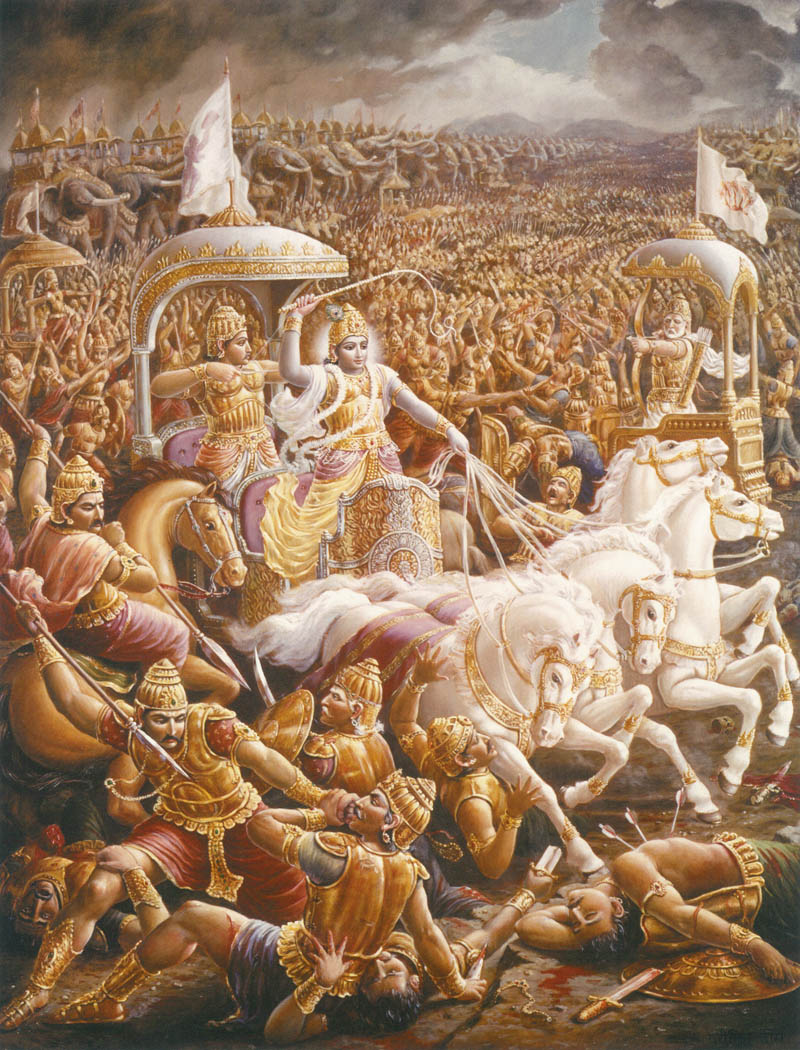 and seeing all his relatives on the opposing side, Arjuna told Kṛṣṇa, “I cannot kill them. Taking the occupation of begging is better than fighting for a kingdom and opulence. Why should I fight just for the sake of winning this kingdom? I should not fight.” Śrī Kṛṣṇa replied, “You should fight.”
and seeing all his relatives on the opposing side, Arjuna told Kṛṣṇa, “I cannot kill them. Taking the occupation of begging is better than fighting for a kingdom and opulence. Why should I fight just for the sake of winning this kingdom? I should not fight.” Śrī Kṛṣṇa replied, “You should fight.”
Śrīpāda Mādhava Mahārāja: Kṛṣṇa told him, “You will be the instrumental cause.”
Śrīla Bhaktivedānta Nārāyaṇa Mahārāja: He inspired Arjuna to fight, but He never inspired Duryodhana. The Pāṇḍavas did not fight for themselves. They wanted only to fulfil the desire of Śrī Kṛṣṇa. Whatever we do, we should do to please Kṛṣṇa. There should be no other reason for any of our activities.
* Nityānanda Prabhu and Śrīla Haridāsa Ṭhākura were not really afraid. It is stated in Śrīla Vṛndāvana dāsa Ṭhākura’s Śrī Caitanya-bhāgavata (Madhya-khaṇḍa, Chapter 13): “The two rogues were now chasing the two saints, and although they cried out, ‘Catch them! Catch them!’ they were still not near them. Nityānanda said, ‘My dear Vaiṣṇava, Haridāsa, we have gotten ourselves into a fine mess; we can call ourselves lucky if we come out of this alive!’ Ṭhākura Haridāsa replied, ‘O Lord, what is the use of talking? Acting on Your advice, we now face unnatural or violent death. On account of You, we have given instructions on the holy name of Kṛṣṇa to these two faithless drunkards and now we are earning our due reaction and punishment: Death!’ Speaking in this manner, Lord Nityānanda and Haridāsa continued to run, laughing gleefully while the two rogues chased after them hurling loud abuses.”
 An excerpt from a morning walk with Śrīla Bhaktivedānta Nārāyaṇa Mahārāja in Murwillumbah, Australia, on February 7, 2008, published in Walking with a Saint – Morning Walks and Conversations 2008
An excerpt from a morning walk with Śrīla Bhaktivedānta Nārāyaṇa Mahārāja in Murwillumbah, Australia, on February 7, 2008, published in Walking with a Saint – Morning Walks and Conversations 2008
Veṇu-gopāla dāsa: When Śrī Kṛṣṇa’s foot was shot by the hunter’s arrow, did He pretend to leave His body, or did His life-air actually leave?
Śrīla Bhaktivedānta Nārāyaṇa Mahārāja: Yesterday I explained this very clearly.
Śrīpāda Padmanābha Mahārāja: Śrīla Gurudeva said last night that all the demigods came to the place where 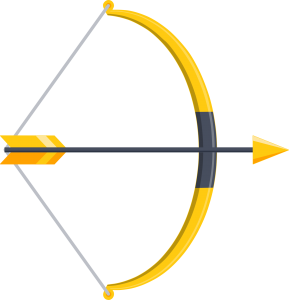 Kṛṣṇa was sitting. There, they praised Him and prayed to Him. At that time, right in front of them, he went to Goloka Vṛndāvana in His original body.
Kṛṣṇa was sitting. There, they praised Him and prayed to Him. At that time, right in front of them, he went to Goloka Vṛndāvana in His original body.
Veṇu-gopāla dāsa: Why did He need to be shot by the hunter?
Śrīla Bhaktivedānta Nārāyaṇa Mahārāja: He did this to bewilder the atheists.
Śrīpāda Dāmodara Mahārāja: Was the hunter actually Bṛghu Muni?
Śrīla Bhaktivedānta Nārāyaṇa Mahārāja: Why Bṛghu? I have not heard this. You may have heard this, but it is not written anywhere in śāstra.
Kṛṣṇa has no karma. How can karma touch Him? Neither Draupadī nor Kṛṣṇa nor any high-class mahā-bhāgavata is subject to the laws of karma. They never experience the fruits of past activities.
Śrīpāda Padmanābha Mahārāja: In the case of Lord Nityānanda Prabhu, when He was hit on the head by Mādhāi, His head started bleeding. But His body is transcendental – sac-cid-ānanda.
Śrīla Bhaktivedānta Nārāyaṇa Mahārāja: This was to bewilder others, to make them think that Nityānanda Prabhu is an ordinary human being, like them. These and similar pastimes are naravata-līlā. In this way one can say, “Oh! Although He was cut and blood oozed from His head, He excused his aggressors. We should follow His example.”
(Source: Purebhakti.com)
Image/Art made possible by Pixabay.com, Krishnapath.org and/or Bhaktiart.net
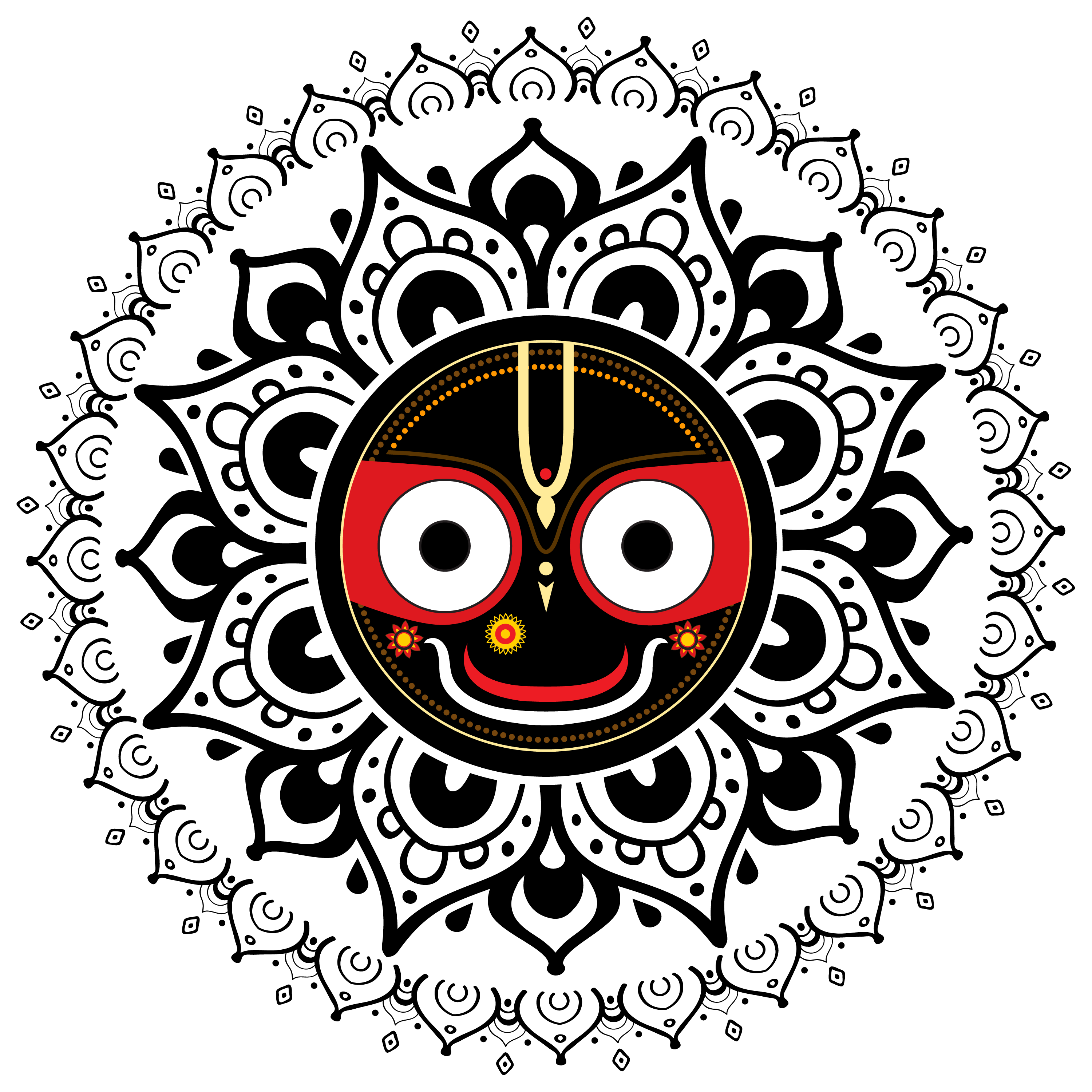







I love these Q&As. They can be very interesting and reveal some topics that are difficult to research.
I truly believe that a spiritual master is not an ordinary person with the power to transform our lives and connect us with a higher consciousness.
Reading this post reminded me of the immense gratitude I have for my own guru.